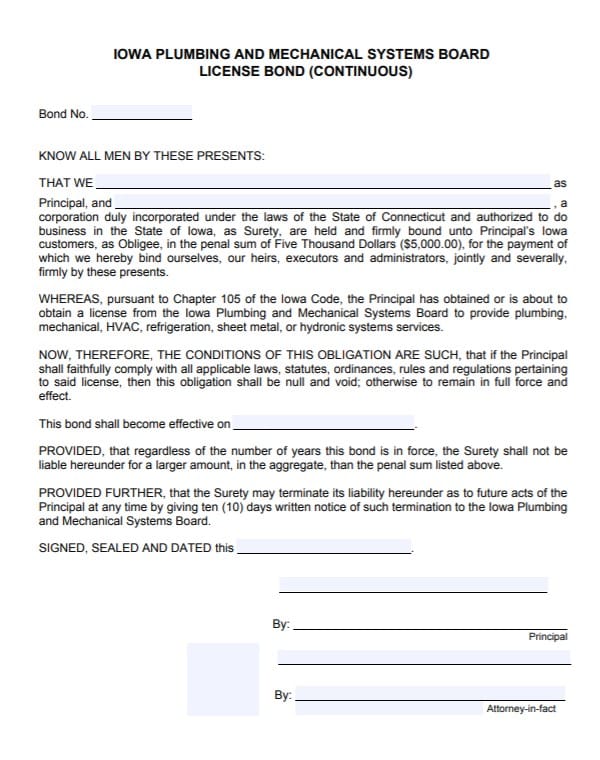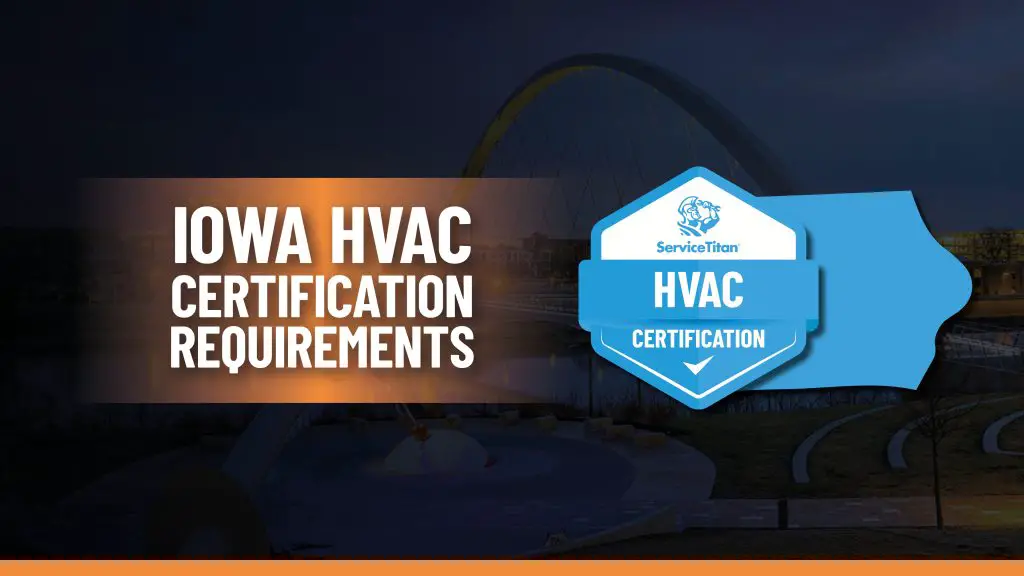Iowa HVAC contractors must hold a state license to operate legally. The Iowa Plumbing and Mechanical Systems Board issues these licenses.
Obtaining an HVAC license in Iowa signifies that contractors have met the necessary state requirements, ensuring they are qualified to perform heating, cooling, and ventilation work within the state. It’s crucial for contractors to get licensed not only to comply with state laws but also to safeguard their business and customers.
The licensing process includes demonstrating adequate experience, passing an exam, and maintaining insurance. For homeowners and business owners, hiring a licensed HVAC professional in Iowa means entrusting their projects to a verified expert, ensuring quality workmanship and adherence to safety standards. Therefore, proper licensing is a cornerstone of the HVAC industry’s integrity and reliability in Iowa.

Credit: iowa.licenselookup.org
Importance Of Iowa Hvac License
The importance of an Iowa HVAC license cannot be overstated. Both homeowners and businesses rely on skilled HVAC professionals to ensure their indoor climate is comfortable and safe. Holding a valid Iowa HVAC license signifies that a technician has met the state’s rigorous requirements for education and experience. It also shows a commitment to industry standards and a dedication to professional growth. Now, let’s delve into the specifics that underscore the significance of this credential.
Regulations For Hvac Professionals
Iowa sets specific regulations for HVAC professionals to ensure service quality. HVAC technicians need to follow these to work legally in the state:
- Education: Completing an accredited program is essential.
- Experience: Technicians must gain practical experience.
- Licensing Exams: Professionals pass exams that test their knowledge.
- Continuing Education: Licensed technicians are required to stay updated on the latest HVAC technologies and standards.
Benefits Of Holding An Hvac License
A valid HVAC license offers numerous advantages:
- Trust: Clients trust licensed professionals more.
- Higher Income: Licensed HVAC technicians often earn more.
- Job Security: Certification demonstrates expertise, securing jobs.
- Opportunities: Licensing opens doors to more advanced roles.
- Legal Protection: A license provides legal right to work and protection under state law.

Credit: www.bondexchange.com
How To Obtain An Iowa Hvac License
Embarking on a career in heating, ventilation, and air conditioning (HVAC) in Iowa requires a professional license. The license serves as proof of expertise and compliance with state regulations. This guide will simplify the process of obtaining an Iowa HVAC license.
Meeting Eligibility Criteria
To qualify for an HVAC license in Iowa, applicants must meet specific requirements:
- Age: Must be at least 18 years old.
- Education: A high school diploma or GED is necessary.
- Experience: Proven work experience in the HVAC field is required.
- Legal Status: Applicants must have legal permission to work in the U.S.
Applying For The License
The application process involves several steps:
- Complete the official Iowa HVAC license application form.
- Submit evidence of your experience and education.
- Pay the prescribed application fee.
- Ensure the application form and supporting documents are accurate and complete.
Send all the documents to the Iowa Plumbing and Mechanical Systems Board for review.
Taking The Exam
After application approval, candidates must pass a comprehensive exam:
| Exam Component | Details |
|---|---|
| Type: | Written, multiple-choice format. |
| Content: | Covers HVAC systems, Iowa code, and safety practices. |
| Scheduling: | Arrange a test date with an approved testing center. |
| Preparation: | Study guides and practice tests are available. |
| Passing Score: | Achieve the minimum required score to pass. |
Successful candidates receive their Iowa HVAC license and become licensed professionals in the state.
Maintaining Your Iowa Hvac License
As a licensed HVAC professional in Iowa, keeping your credentials up-to-date is crucial. Renewal procedures are straightforward. You must meet continuing education requirements. This ensures that you provide the best service to your clients, abide by industry standards, and remain legally compliant.
Renewal Procedures
Renewal Procedures
Iowa requires HVAC technicians to renew their licenses regularly. Follow these steps to renew:
- Submit your application: Use the Iowa Construction Licensing Bureau’s online portal or mail it in.
- Renewal fee: Current fees are listed on the official website. Always check for any changes.
- Renewal deadline: Mark your calendar. Licenses expire on June 30 of even-numbered years.
Continuing Education Requirements
Continuing Education Requirements
Staying informed about the latest in HVAC systems and regulations is key to success. Iowa mandates ongoing education:
| Type of License | Hours Required | Course Criteria |
|---|---|---|
| Journeyman | 8 hours | At least 6 hours must be in the mechanical code. |
| Contractor | 8 hours | At least 6 hours of business and law updates. |
Approved providers offer continuing education courses. Keep records for three years after completion.
Implications Of Working Without An Iowa Hvac License
To operate legally, HVAC technicians in Iowa need a proper license. This ensures adherence to state laws and standards. Without a license, the risks are high. Not just legally, but also for the business reputation. Below we explore these implications in detail.
Legal Consequences
Working without an Iowa HVAC license is illegal. Let’s understand this clearly:
- Fines: Unlicensed work brings heavy fines.
- No Work Permits: Without a license, technicians cannot pull work permits.
- Legal Actions: Customers can sue for damages or poor work quality.
- Blacklisting: Repeated offenses may lead to blacklisting, barring future licensure.
Risks To The Business
The stakes are high for businesses as well. Here are the main risks:
| Risk Factor | Impact |
|---|---|
| Reputation Damage | Customers lose trust, leading to fewer contracts. |
| Insurance Issues | Insurance may not cover unlicensed work, increasing liability. |
| Profit Loss | Fines and legal fees can diminish profits. |
| Invalid Warranties | Equipment warranties might be void if installed without a license. |
| Lack of Growth | Growth stalls without the ability to take on larger, permitted jobs. |
Resources For Iowa Hvac Licensing
If you’re aiming to become a licensed HVAC technician in Iowa, you need the right resources. The process may seem daunting, but with the proper guidance, it becomes much simpler. Below, we’ll discuss vital resources such as official websites and training programs. These will equip you with necessary information and skills. So, roll up your sleeves and let’s delve into the essentials of Iowa HVAC licensing!
Official Websites
Finding credible information is crucial for your HVAC licensing journey. Start with official state websites which provide up-to-date requirements and applications. These websites are gold mines for everything you need about the licensing process.
- Iowa Division of Labor: It offers specifics on licensing, exams, and renewals.
- Iowa Department of Public Health: Access detailed guidelines on standards and regulations.
Training Programs
Quality education shapes a knowledgeable HVAC technician. Iowa has several reputable training programs to choose from. These programs combine classroom instruction with hands-on experiences. Below is a table highlighting some top training providers in Iowa.
| Institution | Program Length | Certification |
|---|---|---|
| Des Moines Area Community College | 2 Years | Associate Degree |
| Hawkeye Community College | 6 Months | Diploma |
| Iowa Western Community College | 6–12 Months | Certificate |
These programs provide essential knowledge and skills for a successful HVAC career. Make sure to check eligibility and accreditation before enrolling.

Credit: www.hvaccertification.org
Frequently Asked Questions Of Iowa Hvac License
How Do I Get My Hvac License In Iowa?
To obtain an HVAC license in Iowa, first complete an apprenticeship or HVAC training program. Then, pass the necessary trade and business exams. Submit your application with proof of experience, liability insurance, and the appropriate fee to the Iowa Plumbing and Mechanical Systems Board.
Does Iowa Require A Contractor License?
Iowa does require certain contractors to obtain a license. Specifically, those involved in plumbing, electrical, and mechanical work must be licensed at the state level. General construction contractors should check local city or county requirements as they may vary.
How Do I Get Epa Certification In Iowa?
To obtain EPA certification in Iowa, enroll in an EPA-approved training program, complete the required course, pass the certification exam, and then submit your application to the EPA along with any necessary fees.
Do You Need A License To Be A Plumber In Iowa?
Yes, to legally work as a plumber in Iowa, you must obtain a state license from the Iowa Plumbing and Mechanical Systems Board.
Conclusion
Navigating the requirements for an Iowa HVAC license can be a straightforward process with the right information and guidance. Ensuring compliance with state regulations is essential. Armed with knowledge and determination, you’re now set to embark on a successful career in Iowa’s HVAC industry.
Remember, proper licensing is your ticket to credibility and professional growth.

